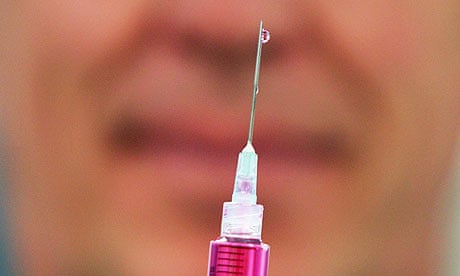Monday night's Dispatches – The Truth About Drugs in Football followed the same cycle as several recent sport documentaries. Hype whipped up by the programme makers – teasing viewers that they would reveal the identity of a "multi-million pound footballer" who had secretly failed a test for cocaine – was followed by a collective shrugging of the shoulders when the player in question turned out not to be a current Premier League player but a wayward Scottish striker who had been released on a free transfer by Birmingham City.
If the Football Association is to be taken at its word Garry O'Connor, who is now back in the Scottish Premier League with his first club Hibernian, is an exception in that he was an established international when he tested positive and served his ban in secret. Those close to the player say he has been clean and sober for months and he has played his way back into contention for the national side, although he still has a court case hanging over him. It remains to be seen how his public shaming affects him.
But while it may have been short on killer revelations, the programme did provoke an interesting debate. Is the Football Association right to defend its policy of keeping the names of those who have failed tests for recreational substances confidential? It argues that most of them are young players who deserve the opportunity to face down their demons in private after serving their ban (usually between two and six months for a first offence). It claims that support and rehabilitation are more effective than public shame – especially as most of the players are unknowns.
It is a persuasive argument. But there are many others who believe that only "naming and shaming" will act as enough of a deterrent to prevent players – who may go on to become role models – from dabbling in recreational drugs and potentially developing a serious addiction. It may also be argued that they should be named in the interests of transparency.
As it is, they are listed on the UK anti-doping database but are not generally named. A glance at the list of offences between 2004 and 2010, compiled by the Sporting Intelligence website, would suggest there is not an endemic problem in English football. But that does not mean it is not right to ask the questions. There is a nagging feeling that football will name transgressors when it suits: if a club has a high-earning player who has become a problem to get off the books for example.
The programme left the impression that not enough energy was devoted to the other side of the equation: the issue of performance-enhancing drugs and their prevalence (or lack of) in football. With all the advances in sports science and the sophistication of top clubs over the past 20 years, a sober analysis of where that may lead might have proved more enlightening.
Nor is it correct to assume that all is completely well between drug testing authorities and the world's richest sport. A long-running standoff over Wada's proposed "whereabouts" rules remains unresolved with both sides locked in an uneasy truce and there remains an undercurrent of dissatisfaction with the fact that Wada believes football does not think it has a problem.
"They're saying they haven't got a doping problem because there are not many positives tests. I think the answer to that is: don't we need to conduct better research to see what the prevalence of doping is? We know full well that science is not going to find all the cheaters," the Wada director-general David Howman told the programme.
And there is a wider question about whether sports should be testing for recreational drug use at all. Some of the most experienced and persuasive voices in the anti-doping community believe that going after those who may have used cocaine or cannabis socially is a sideshow to the war on systematic cheating by doping.
The FA points out that it is not obliged to test for what it calls "social drugs" under the Wada code but does so because it recognises its responsibilities – it was the first governing body to ban them in and out of competition.
The question of whether bans should be shorter for track and field athletes found with recreational drugs in their system recently raised its head again after UK Anti-Doping proposed they should be classified as "specified substances". That would allow those found to have taken them to argue for a reduced penalty.
Some, including Sebastian Coe and the government, are vociferously against. They maintain that zero tolerance of any drugs is the only way forward, with Lord Coe claiming that lesser penalties for recreational drugs represented the "morality of the knackers yard". Others argue that ruining the prospects of a young athlete or academy footballer for the sake of a youthful indiscretion, which may occur during the close season or out of training, is very different from deliberate cheating and is no justice at all.

